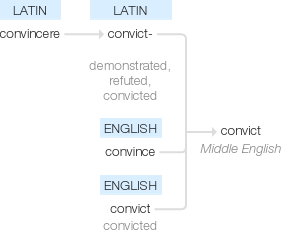Convict
Middle English: from Latin convict- ‘demonstrated, refuted, convicted’, from the verb convincere (see convince). The noun is from obsolete convict ‘convicted’.
wiktionary
From Middle English convicten, from Anglo-Norman convicter, from Latin convictus, the past participle of convincō(“to convict”). Doublet of convince.
etymonline
convict (v.)
mid-14c., "to convince by arguments, convince of wrongdoing or sin" (a sense now obsolete), from Latin convictus, past participle of convincere "to 'overcome' in argument, to overcome decisively; to convict of crime or error," from assimilated form of com-, here perhaps an intensive prefix (see com-), + vincere "to conquer" (from nasalized form of PIE root *weik- (3) "to fight, conquer").
Meaning "prove or find guilty of an offense charged" is from late 14c. It replaced Old English verb oferstælan. Related: Convicted; convicting.
convict (n.)
late 15c., "person proved or found guilty of an alleged offence," from obsolete adjective convict "convicted," from Latin convictus (see convict (v.)). Slang shortening con is from 1893.
